https://www.youtube.com/watch?v=5ZH43ej3wys
Benihana Fried Rice Secrets Revealed
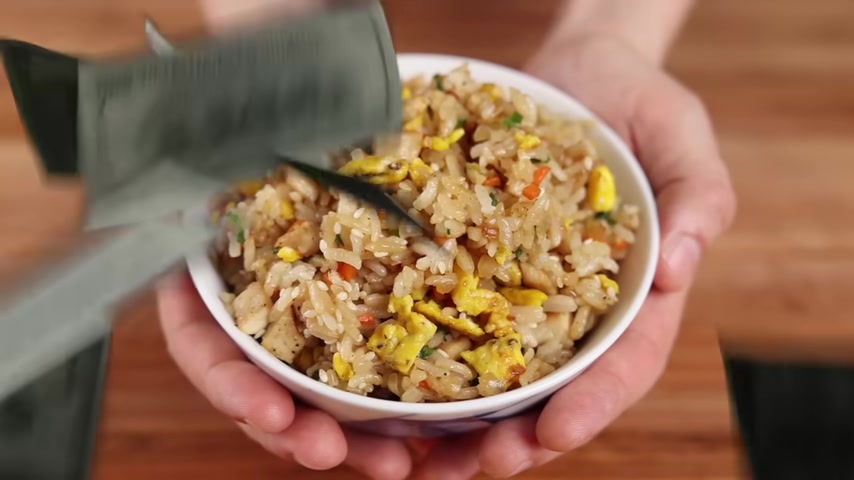
Over the past several years , I've made Benihana's fried rice at home hundreds of times and through lots of trial and error .
I truly believe I finally perfected it today .
I'm going to share absolutely everything .
I've learned all my secret tips , tricks and techniques .
So by the end of this video , you'll be able to make hibachi fried rice at home even better than any Japanese steakhouse you've ever been to .
And for a fraction of the cost .
Now , the foundation of any fried rice is the rice for their version , Benihana uses a medium grain variety from California called Cow Rose .
These are the three most common brands of Cow Rose you'll find in most grocery stores and while any of them should work fine , if you want to use exactly what Benihana uses .
Grab a bag of Boan .
It's a very popular brand of rice and it should be available pretty much everywhere .
But I'll include some links in the description if you can't find it because Cow Rose is a medium grain , it's inherently very sticky , smaller grains of rice tend to be higher in a starch called Aloin , which is what makes rice sticky .
But contrary to popular belief , stickiness isn't the enemy of a good fried rice .
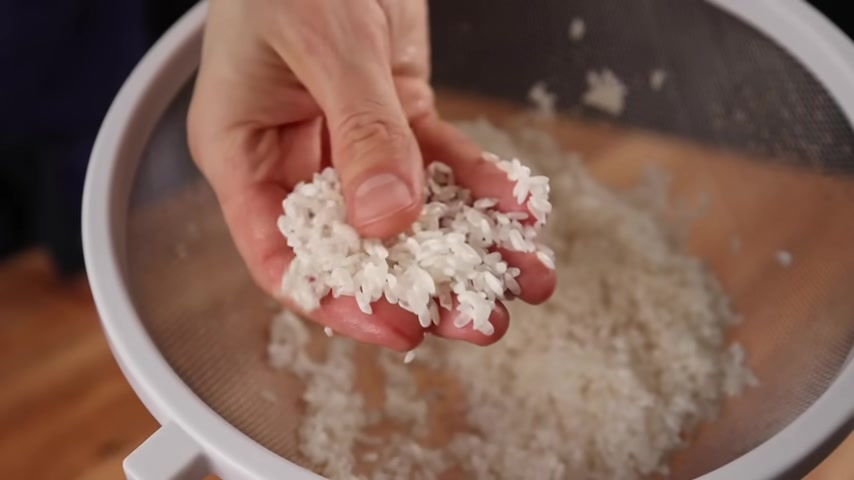
Most Japanese fried rice is made with short grain .
The kind you use in sushi , which is even stickier than medium grain .
The real culprit in mediocre fried rice isn't stickiness .
It's moisture , which leads us to our next question .
What is the best way to prepare cow rose rice at home ?
So I don't end up with a soggy mess .
The first thing we'll need to address is should I wash my rice before cooking for the record ?
Benihana does not wash their rice because they're cooking such large quantities .
It's probably not worth the labor .
They'd have to pay for this step .
However , at home , we don't have this concern and you do get a better end result with washed rice .
So my advice is to go ahead and wash it .
What this does is remove some of the surface starch resulting in a slightly less sticky final product .
I like to put my rice in a strainer that's in a bowl and fill it up with water , agitate the rice and swirl it around about 5 to 10 times .
Then lift the strainer and dump out the starchy water .
Repeat this step about 3 to 5 times .
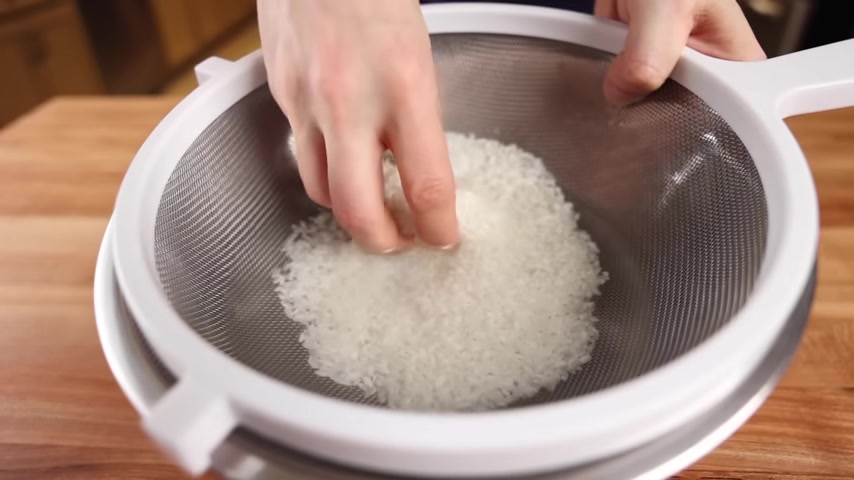
And when you notice the water is a bit clearer than when you started , you're ready to go and note , you don't want to overdo it because if you leave the rice in the water too long you could up hydrating it too much and that will make it soggy .
It doesn't have to be perfect .
You just want to remove some of that excess starch from the outside of the grains and make sure the rice is totally drained before proceeding .
The next thing we'll need to address is how to cook the rice .
I found there are basically three optical methods for properly preparing rice at home , for fried rice .
So let's go over them in order of preference .
I think it goes without saying the best method for preparing rice is in a rice cooker .
This is what they use at restaurants .
Rice cookers are fail proof and they take all the and anxiety out of cooking rice perfectly prepared every time .
If you have a model with a harder rice option , which makes a slightly less hydrated grain .
This is what you want to use for fried rice .
But I know not everyone , especially in western countries has a rice cooker .
So the next best way to prepare your rice is by steaming it .
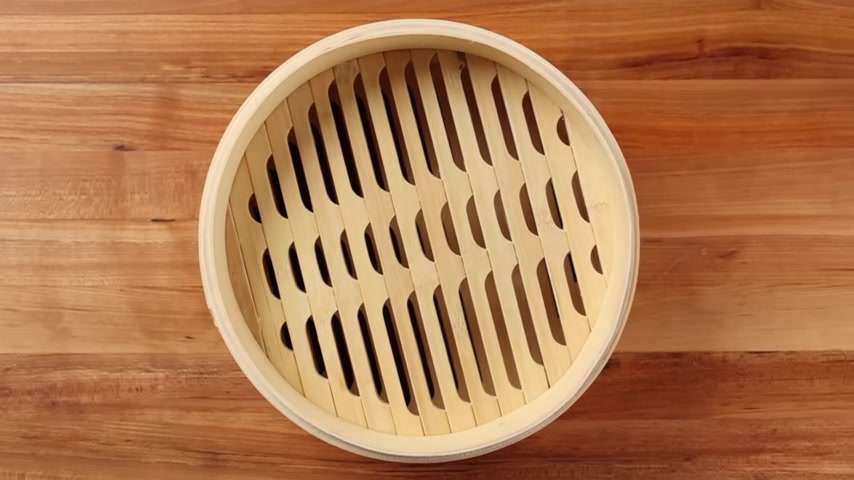
And I know this may sound strange to some , but this is the traditional method of preparation in Asia where they'll often use bamboo steamer baskets like this .
But you don't need any special equipment .
You can steam rice with items , you in your kitchen right now .
What you want to do is take a steamer insert or something like a colander or anything that will lift a bowl off the bottom of a pot .
Place the insert at the bottom of your pot and fill it with about an inch or 2.5 centimeters of water before you wash your rice .
Weigh it for our recipe today , I've got one cup or 180 g of cow rose after the rice is washed , place it in a bowl and fill it with three quarters of a cup or 180 mL of water .
If you have a scale , the weight of the rice in grams and the water in milit should always be the same for perfectly steamed rice .
If you're doing volume measurements like cups , the volume of water is always going to be about three quarters the amount of the volume of rice .
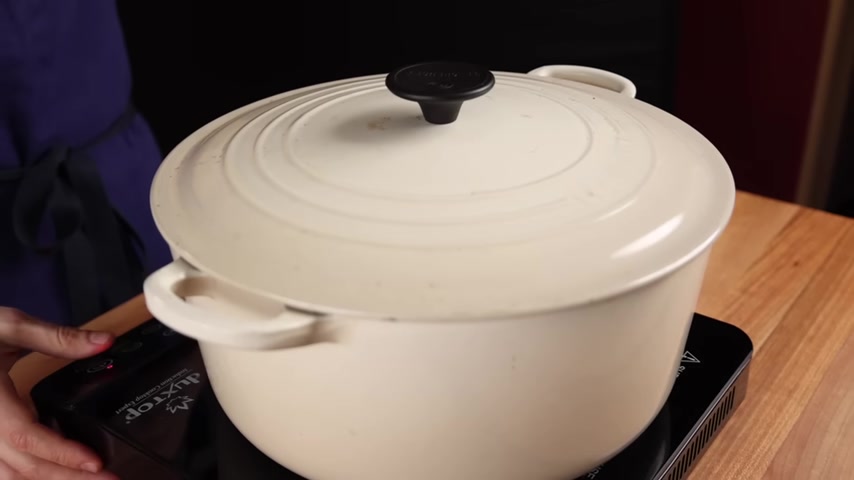
All the instructions are in the video description , then place the bowl on top of the steamer insert and bring the water in the pot up to a boil over high heat , put the lid on the pot and lower the heat slightly to maintain a simmer .
After 20 minutes , turn off the heat and allow it to steam for 10 additional minutes , then remove the lid and you should have a bowl of perfect steamed rice that is virtually indistinguishable from a several $100 rice cooker .
The last method and probably the most common one in the West is cooking rice on a stovetop in a pot via the absorption method .
I found that cal rose rice for fried rice works best with an equal amount of rice and water by volume .
But with one extra tablespoon or 14 mL of water added to account for evaporation .
So if you're cooking one cup of rice , add one cup in one tablespoon or 250 mL of water .
If you're cooking two cups of rice , add two cups and one tablespoon of water .
Any amount is a 1 to 1 ratio with a single added tablespoon of water .
So let's place our washed rice in a pot here .
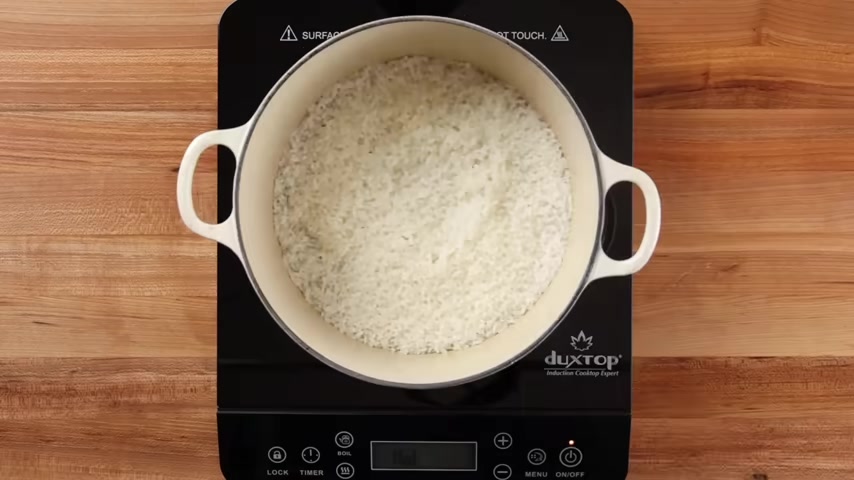
I've got one cup or 100 and 80 g , then add one cup and one tablespoon or 250 mL of water and bring to a boil , place the lid on the Pott , lower the heat to medium low .
I'm using heat setting three on my stovetop and cook for 10 minutes .
Now kill the heat and allow the rice to steam with the lid on for an additional 10 minutes .
Remove the lid , transfer the rice to a baking sheet and fluff out the grains a bit .
Next , we'll need to determine whether or not to refrigerate or cooked rice .
Through my extensive testing .
I found that with rice cooked in a rice cooker or via the steaming method , all you really need to do is let it come to room temperature before cooking with the stovetop method .
However , after the rice has been fluffed and completely cooled down , I would really advise you to let it sit uncovered in the fridge for 12 to 24 hours .
I've gotten the most consistent results with this method .
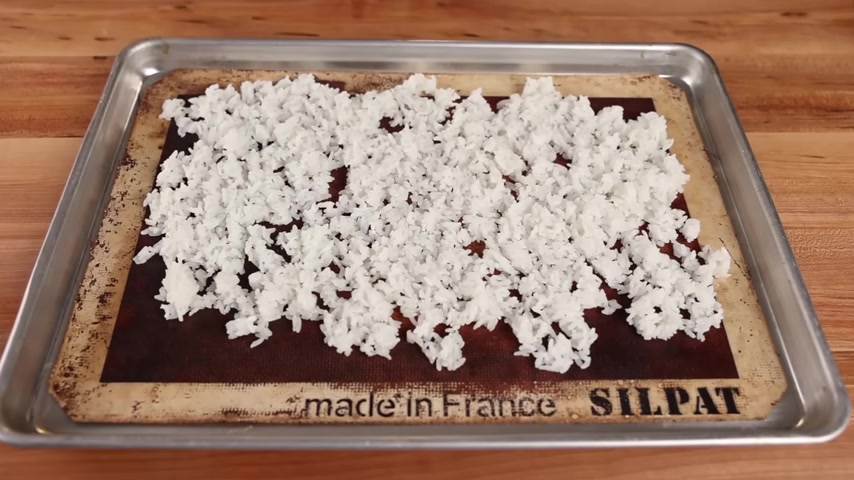
But if you , I can't wait that long at the bare minimum , I would let it sit out at room temperature uncovered for several hours before using this is going to let some of the surface moisture evaporate and really yield the best final product .
Now for the garlic butter , Benihana's fried rice is basically a westernized version of the more traditional Japanese garlic fried rice , also known as Yaki meshi or Garoua .
So the one thing that gives Benihana's rice its distinctive taste is the hibachi garlic butter .
I have an entire video breaking down exactly how to make it like they do at the restaurant at home .
If you want to check it out , I'll link to it at the end .
But since we only need a couple of tablespoons today , I'm gonna show you how I make very small amounts .
Just take two tablespoons or 28 g , unsalted butter and allow it to come to room temperature , then add one half teaspoon or 1.5 g of minced garlic and one half teaspoon or 2.5 g of kium and soy sauce .
Mix the garlic and soy sauce into the butter until it's totally homogenous and you don't see any liquid at the bottom of the bowl then set aside for the vegetables .
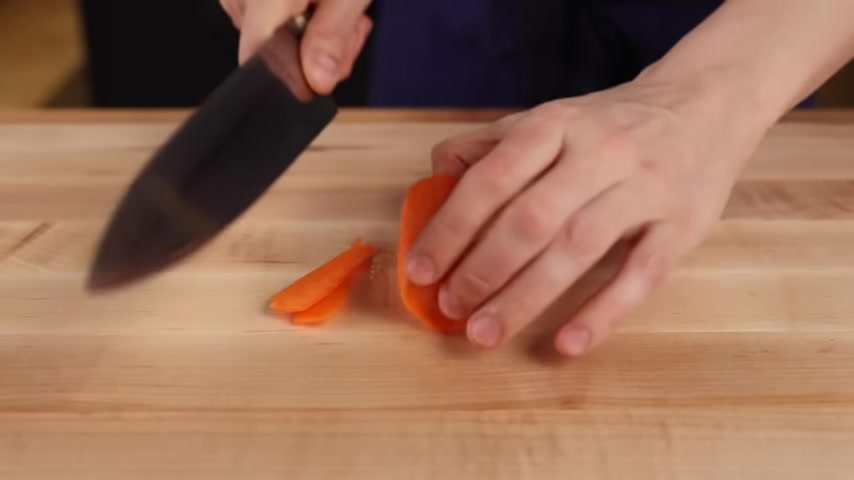
The biggest mistake I see is people cutting them way too large with the onion and carrot .
We're going for a fine dice also known as a B Bruno for the carrot .
Once it's peeled , cut it in half , then trim off a bit from all four sides .
So you essentially create a square like this .
Now make about 2 to 3 millimeter cuts down the length of the square .
So you get little sheets of carrot , take these sheets and once again make cuts down the length of them .
So you get little Julienne slices like this , take your Julienne strips , turn them perpendicular .
And once again , make about 2 to 3 millimeter cuts , which should give you a perfectly cutis Carrot for the onion .
You don't really see it in the final dish .
So I'm not as careful as I am with the carrot .
So just make sure to dice it very well while trying to avoid big chunks , something like this is close enough to a B Bruno cut for the green onion .
Just use a very sharp knife to make as thin a slice as you can manage .
And something like this is perfect for the chicken .
Once again , the biggest mistake I see is people cutting it way too large .
You're really going for cutlets that are about a quarter of an inch or roughly half a centimeter thick .
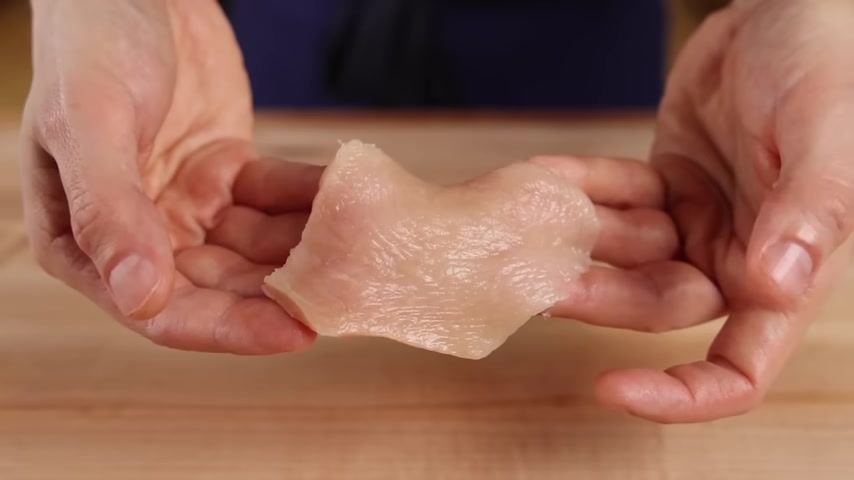
Now , there are a number of ways to accomp push this first flip your boneless skinless breast over and remove the tenderloin , you can use it here or reserve it for another use .
I'm used to making diagonal cuts like this from cutting fish for sushi .
So if you're comfortable with your knife skills , you may find this the easiest method .
But I think for most people , it's going to be much easier to just take the breasts , turn them sideways and make a quarter of an inch to half a centimeter slices directly down like this .
This cross cut is more like how fish is cut for sashimi instead of the diagonal slice that is used for sushi .
Either of these methods should give you the right cut .
We just want very thin cutlets to avoid gigantic chunks of chicken in your fried rice .
Now , once you've got all your ingredients prepped , there are two keys to making hibachi fried rice properly .
The first is having everything assembled and ready to go .
You can do all this in one pan but you want all the ingredients weighed out and measured before you start .
Everything you see here is for two servings , but there is a link in the video description to a document with the corrected ratios for larger servings .
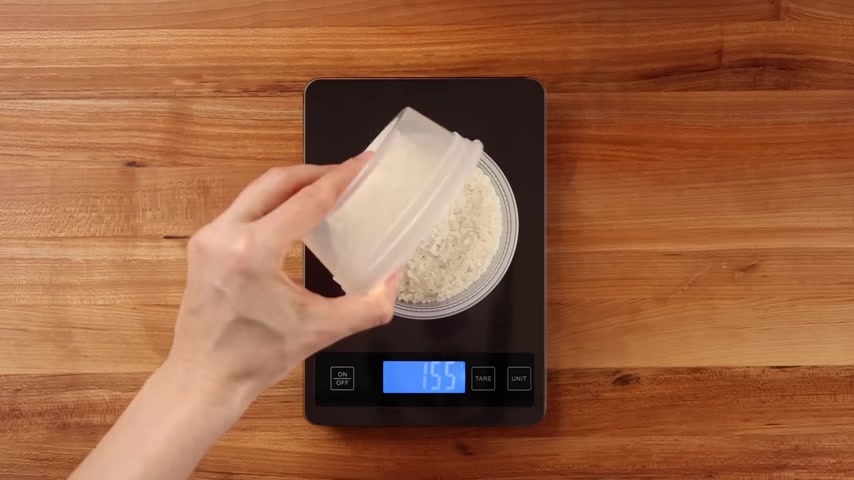
So let's start with two cups which is 10 ounces or 283 g of cooked cow roast rice that is cooled to room temperature and note this is the post cooking weight of the rice .
This amount was made from about one cup or 180 g of uncooked rice .
We've got two large eggs that have been whisked until all the whites and yolks have combined in their uniform and color .
Two ounces or 56 g of thinly sliced chicken breast cutlets , one half cup or 65 g of finely diced yellow onion , two tablespoons or 20 g of finely diced carrot and two tablespoons or 7 g of very finely sliced green onion tops .
We'll also need two teaspoons or 8 g of sesame seed , one tablespoon or 16 g of cumin brand soy sauce and two tablespoons or 30 g of garlic butter .
There will be a bit of garlic butter left over , but it's just easier to deal with round numbers for such a small amount .
We also have salt and pepper for seasoning .
And the last thing you'll need is safflower oil .
Although any neutral oil like vegetable or canola works fine here .
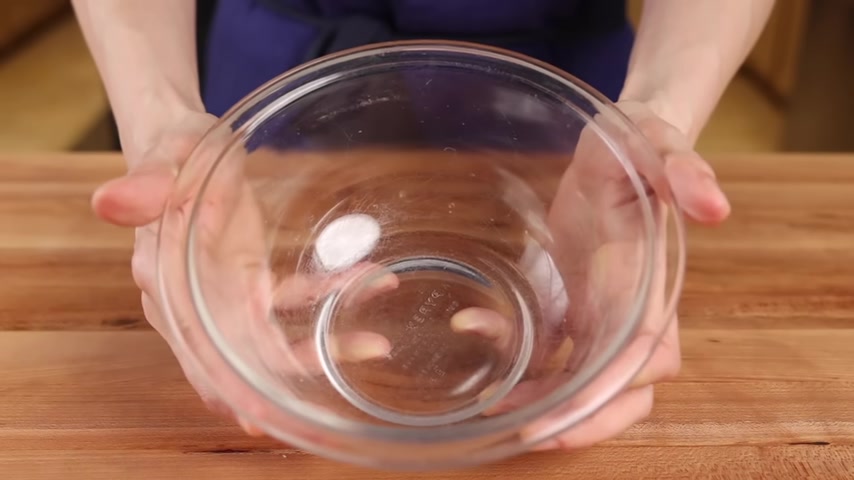
So just use whatever you've got on hand .
I've also got paper towels to wipe out the pan after each step in a bowl to assemble all the cooked ingredients .
Now take your largest cast iron or nonstick skillet or frying pan and place it over medium heat here .
I'm using a 12 inch cast iron skillet , heat up a bit of oil and season the chicken with salt and pepper , then cook the chicken on both sides until it's done .
It should just take a minute or two because it's so thin then kill the heat and remove the chicken from the pan to a cutting board .
Make very thin slices about a quarter of an inch or roughly one half centimeter thick .
Take those slices and turn them perpendicular .
Make cuts exactly the same size down the length of each slice .
This should give you the exact tiny cubed cut we're looking for , then turn the heat back on to medium and once it's hot , return the chicken to the pan , add one teaspoon or 5 g of garlic butter and a bit more salt and pepper to the chicken and stir until the garlic butter has completely melted and coated the chicken .
Then transfer the cooked chicken to your bowl .
Wipe out your pan with a wet paper towel and make sure it's clean .
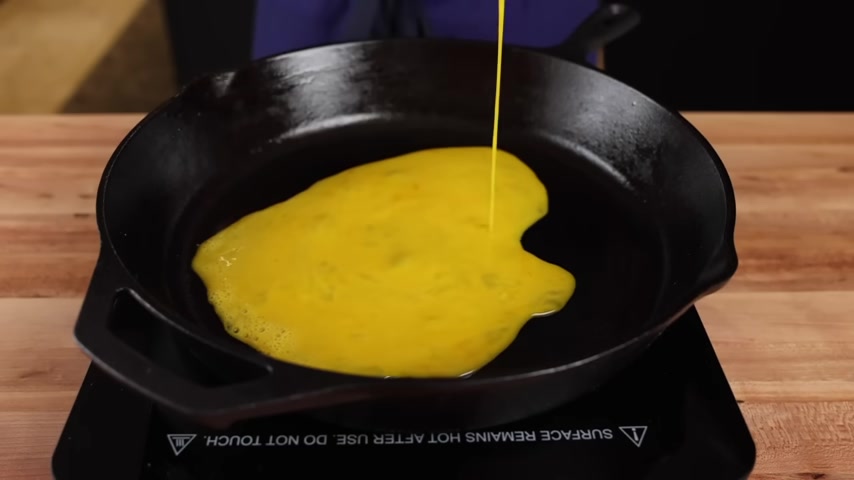
Return the heat to medium and add a bit of oil .
Once it's hot , add your eggs season with a bit of salt and pepper and cook until the egg has completely set .
While it's cooking .
You'll want to break it up a bit as you don't want huge bites of egg in the final dish .
Once it's done , add the egg to the bowl with the chicken , wipe out your pan again with a wet paper towel and return it to medium heat .
Add a bit of oil and once it's heated , toss in the onion and carrot season with salt and pepper and cook until they have slightly softened because they're so small .
This should only take about two minutes after the vegetables are almost done .
Toss in the green onion and give a good stir and kill the heat .
Then transfer the cooked vegetables to the bowl with the egg and chicken .
Wipe out your pan once again with a wet paper towel and make sure it's clean .
Return the heat to medium and add a bit of oil .
You need less oil than you think .
If you use too much .
The final dish can end up very oily because we'll also be adding garlic butter .
At the end , I typically use about a teaspoon of oil per cup of rice .
So two teaspoons here , once the oil is heated , add the rice and spread it out as much as you can .
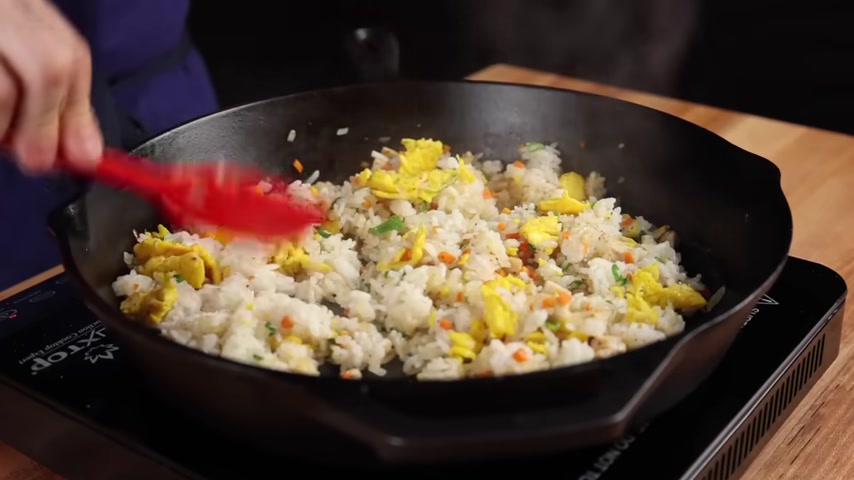
The second key to making great hibachi fried rice is this step .
You really want to try and not crowd your pan .
You need to give the rice room to allow all the moisture to evaporate .
So take a couple of minutes here really allowing the rice to cook in the pan all while gently breaking up any large clumps .
You see turning the rice over and really letting the heat separate the grains for you after you've cooked the rice for a couple of minutes and broken up any large clumps , add the cooked ingredients and stir to make sure they are well combined with the rice .
Continue breaking up any large chunks .
You see and after the rice and vegetables are totally combined .
Add one tablespoon or 15 g of hibachi garlic butter and salt and pepper to taste , stir the butter into the rice and make sure everything is completely coated in the melted butter and cook for about one minute .
Then push the rice to one side and make a space in the pan .
Add the soy sauce directly to the pan and not on top of the rice .
Remember when we said moisture was the enemy of grape fried rice .
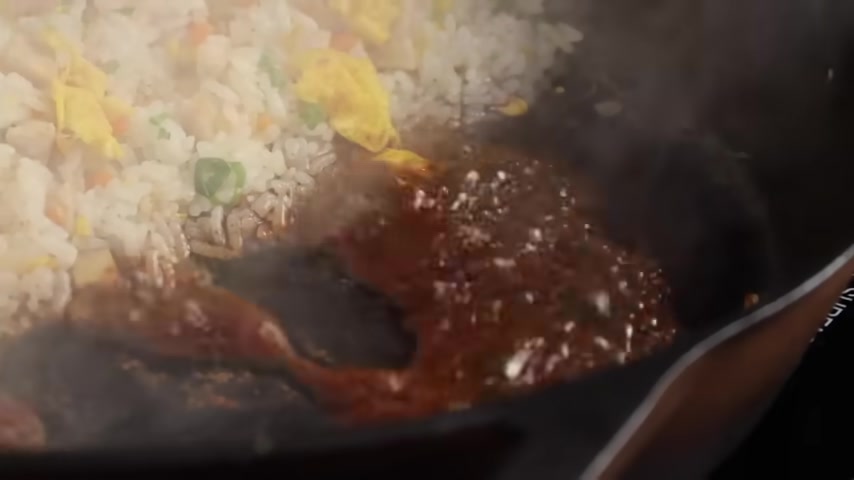
What this does is allow the soy sauce to caramelize very slightly and it gives the final dish a bit more depth of flavor .
After you've added the soy sauce to the pan , immediately stir the rice into it .
Keep stirring the rice with the cutting motion until all the rice is seasoned with the soy sauce .
And you don't see any large chunks of white rice , then kill the heat toss in the sesame seeds and you're ready to serve just like this .
You can also garnish with a bit more sesame seeds or some green onion .
It's up to you .
Now there are infinite variations of this dish and I really want you to look at this video as more of a template .
If you don't have cow rose rice , just use whatever you have on hand .
I make this dish with jasmine rice all the time and it's great if you like steak or shrimp , fried rice , just replace the chicken with either of these .
If you like spicy fried rice , check out my spicy sauce video and toss in a bit of that at the end .
You can also leave out the meat all together for a vegetarian or egg only version .
There are any number of ways to make this dish .
But today I've laid out absolutely everything I know about making great hibachi fried rice .
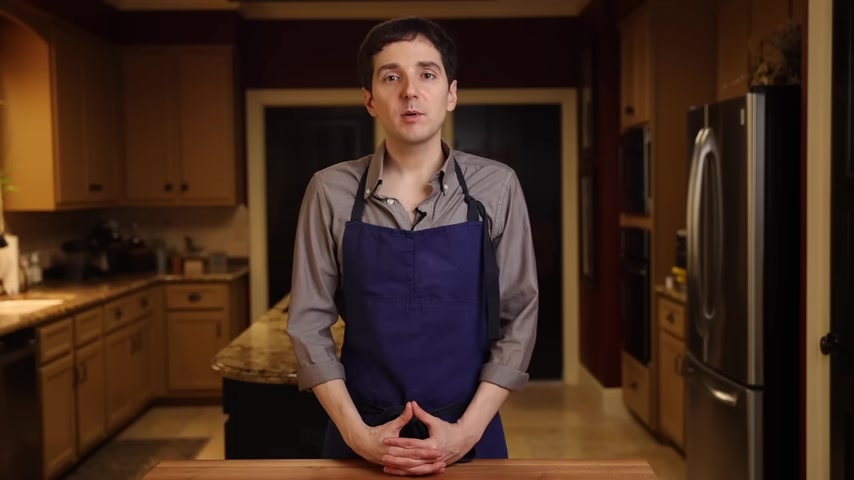
And hopefully some of these tips and tricks will help you level up your own fried rice game .
If you'd like to learn how to make the hibachi garlic butter , check out this video and if you'd like to learn some more hibachi at home recipes , make sure to check out this playlist .
Thanks for watching .
See you next time .
Are you looking for a way to reach a wider audience and get more views on your videos?
Our innovative video to text transcribing service can help you do just that.
We provide accurate transcriptions of your videos along with visual content that will help you attract new viewers and keep them engaged. Plus, our data analytics and ad campaign tools can help you monetize your content and maximize your revenue.
Let's partner up and take your video content to the next level!
Contact us today to learn more.